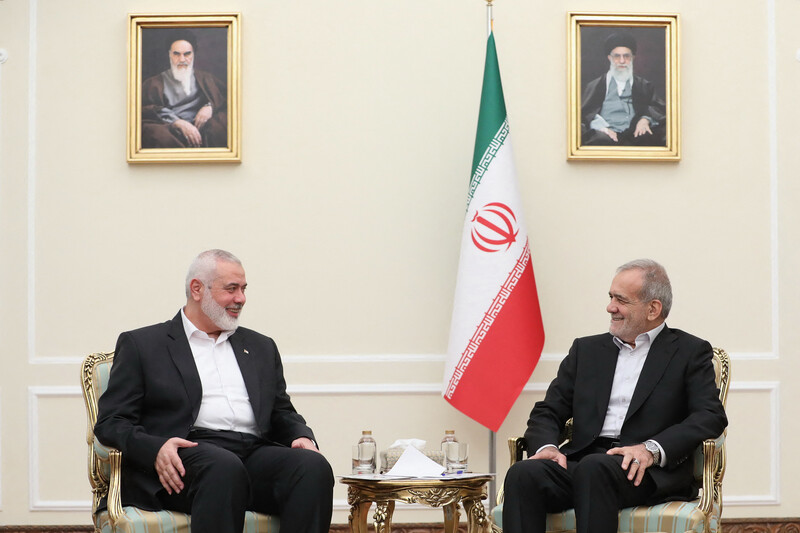Power Suits 31 July 2024

Hamas leader Ismail Haniyeh meets new Iranian President Masoud Pezeshkian in Tehran on 30 July.
ZUMA PressAmong all human endeavors, war theorist Carl von Clausewitz long ago argued, none more resembles gambling than war.
The assassination of Ismail Haniyeh, head of Hamas’ political bureau, represents yet another throw of the dice by Israel, compulsively addicted to the use of deadly violence for political ends that, like a gambler’s fever dreams of riches, are inherently improbable.
While Israel has – unlike with some of its other recent high-profile assassinations – reverted to “no comment” type, there seems little doubt who was behind the missile strike that struck a residence in Tehran, killing Haniyeh and a bodyguard.
The questions then become why, why now, and what now?
Israel has made no secret that any Hamas member is fair game.
And from the perspective of Israeli Prime Minister Benjamin Netanyahu’s stated war aims to destroy Hamas, the murder of senior Hamas leaders is consistent.
The occasion and location, however, in Iran’s capital where Haniyeh was visiting to attend the swearing-in ceremony of Iran’s new president, Masoud Pezeshkian, shows Israel is willing to risk any kind of conflagration, including regional war, in order to carry on with and deflect from its genocide in Gaza.
Ceasefire
Much has already been made of the possible adverse effect on ongoing negotiations for a ceasefire in Gaza.
As Qatar’s prime minister, Sheikh Mohammed bin Abdulrahman Al Thani, put it: “How can mediation succeed if one side assassinates the other side’s negotiator while targeting civilians in Gaza?”
The question, however, presupposes that there is genuine interest in mediation. And the answer is contained in the question. It can’t. Israel knows it can’t. Hence the timing.
Israel’s government is not interested in a ceasefire. If it were, it would not have rejected every previous effort, rather than escalate just as diplomacy looked like it might bear fruit.
Having largely leveled Gaza, but failed to end Hamas’ fighting capability there, Israel is left with few targets other than civilians for its trigger-happy soldiers, who have so far shown no stomach to enter into tunnel fighting, the only real military option left in Gaza.
Given its efforts to force Palestinians out of Gaza have also so far foundered on a lack of Egyptian cooperation, Israel’s leaders have been under both international and domestic pressure to reach an agreement that would allow for an exchange of captives.
Thus provoking Hamas to pull out of negotiations is a get-out-of-jail-free card for Israel.
Regional war
Hamas, however, was never the obstacle to a ceasefire. As it is Israel that is anyway rejecting a deal, Hamas has no incentive to pull out of talks.
It also has no real option to escalate in Gaza, where maintaining its defensive military capabilities remains the priority.
A military reaction from Hamas is unlikely to give Israel any pretexts to avoid diplomacy.
Hamas could escalate in the West Bank – where the Palestinian Authority is increasingly losing control – but is unlikely to want to be seen as provoking civil strife at the moment, especially after the recently concluded Beijing unity talks.
It was notable that Mahmoud Abbas, the PA president, rushed out a statement condemning the assassination of Haniyeh as a “cowardly act.”
Thus Israel’s choice of location. Killing Haniyeh in Tehran is a double escalation: Not only to provoke Hamas, but to provoke Iran.
Israel is absolutely prepared to risk regional war and take for granted that its western allies will come to its aid in the case of a massive military response from Iran.
After all, they did so before. And the US has already announced it will do so again.
That too is unlikely to work, however.
Iran – as was clear in April when it effectively emptied its arsenal of expendable ordnance in a show of retaliation that was so clearly sign-posted it amounted to a deescalation – is neither interested nor ready for an all-out military confrontation with Israel, especially since it could drag in the United States.
There will be a reaction, of course, and Iran has already stipulated revenge as a “duty.”
But it is likely to be as measured as its response in April, which came after Israel killed several Iranian military officials in the Iranian embassy in Damascus.
Hizballah
The more likely reaction will come from Lebanon, where, hours before Haniyeh’s assassination, Israel proudly claimed the killing of two children and one woman in Beirut in targeting Hizballah commander Fuad Shukr.
That strike alone has set the scene for an intensification of the tit-for-tat fighting in Lebanon’s south that has been waxing and waning since 7 October, and which has seen Israel bomb large tracts of southern Lebanon while some 80,000 Israelis have been evacuated from Israel’s north due to Hizballah rocket attacks.
The real threat of greater conflagration is there. But it was there before Haniyeh’s assassination.
Every reaction provides yet another element to war’s “play of probabilities, possibilities, good and bad luck, which spreads about with all the coarse and fine threads of its web,” as von Clausewitz put it.
Indeed, it is hard to understand Israel murdering Haniyeh as anything but yet another example of the hubris and arrogance of a state that has been allowed to carry out a genocide for 10 months without any serious repercussions, and an attempt to divert attention from the horrors it is perpetrating in Gaza.
There may be some who hope that killing the head of Hamas will provide Israel with a “victory” that might allow space for a ceasefire deal to be struck. But that would be misreading Israel in general and misreading this Israeli government in particular.
Israel is not finished in Gaza. It does not want to be finished in Gaza.
And for as long as the arms flow, Israel will continue to gamble, to escalate, to murder, to destroy and to provoke.




